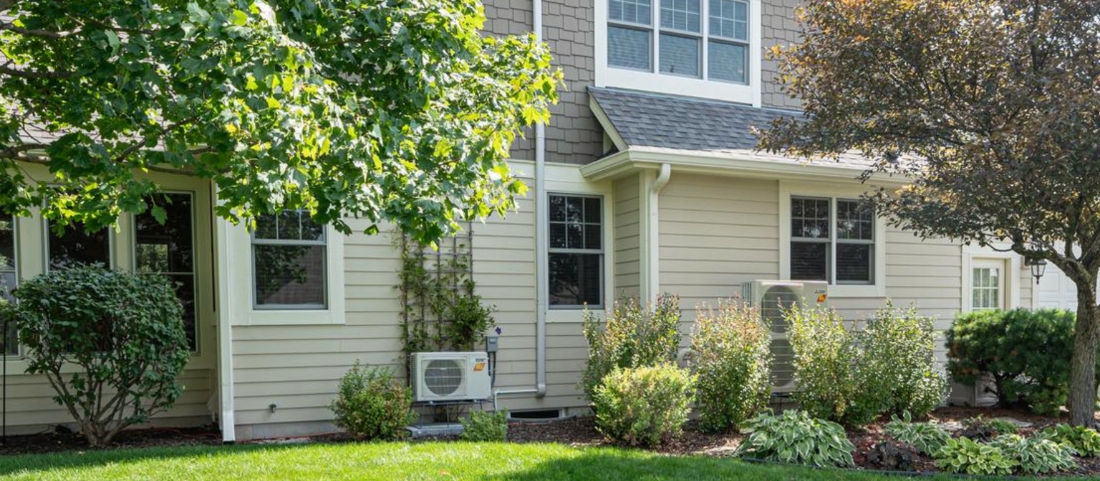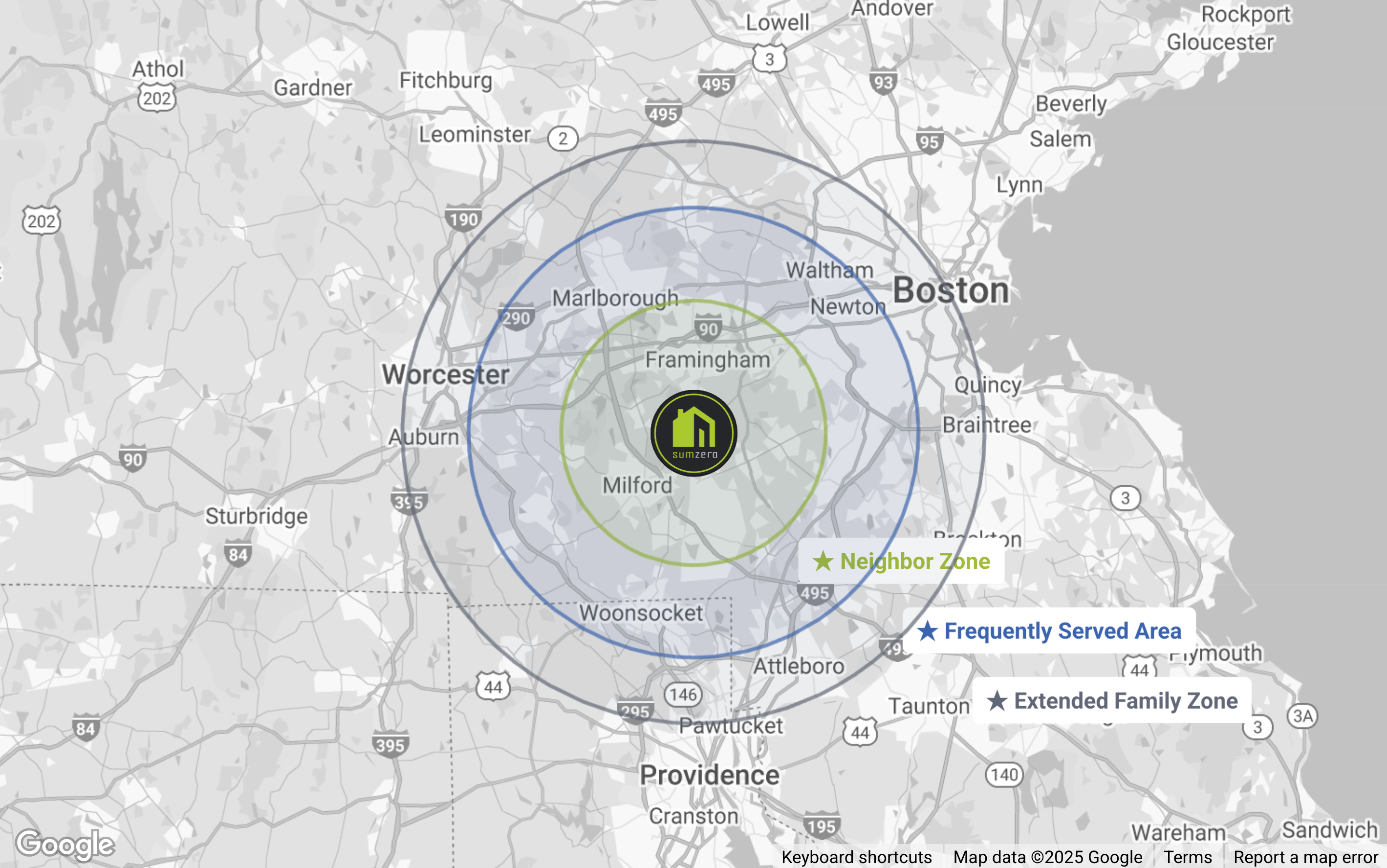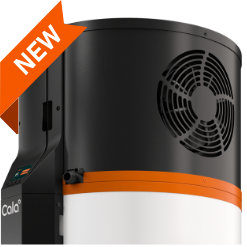Gas to Heat Pump Conversion | Boston, MA
Converting gas to heat pump means replacing your outdated gas furnace with an energy-efficient electric heat pump system to lower utility bills and improve year-round comfort. If you're in Boston, SumZero makes it easy to replace gas furnace with heat pump technology—helping you cut energy costs fast while preparing your home for a clean energy future.

Why Boston Homeowners Are Choosing to Convert Gas to Heat Pump Systems
In Boston, where long winters and variable shoulder seasons dominate the calendar, heating is more than just comfort—it’s essential. Traditional gas furnaces, while once reliable, are increasingly being replaced as homeowners seek out cleaner, more efficient alternatives. That's where converting gas to a heat pump system comes in.
Whether you live in a classic triple-decker in Dorchester or a colonial in Newton, your home likely depends heavily on heating for much of the year. By choosing to convert your gas system to a modern heat pump, you not only slash your monthly bills but also streamline your home’s energy use. SumZero Energy Systems specializes in helping Boston-area homeowners transition to efficient heating and cooling, focusing on returns that improve both comfort and the environment.
“With Boston’s cold winters and unpredictable spring and fall temperatures, the flexibility of ducted heat pump systems makes them a smart choice for our climate.” — Local HVAC Expert, Cambridge, MA
Let's explore how SumZero helps you replace gas with a cleaner, cost-effective solution designed for New England homes.
Why Convert Gas to Heat Pump in Boston?
Economical Benefits of Heat Pump Systems
Heating costs in Boston can fluctuate dramatically, especially with volatile natural gas prices. Replacing gas furnaces with air source heat pump systems stabilizes your utility costs. Heat pumps are up to three times more efficient than traditional gas heating. Instead of generating heat from combustion, they transfer ambient heat from the air—a method that dramatically reduces energy use.
Through state rebates and federal incentives, many Boston homeowners can cover a significant portion of installation costs. Mass Save offers rebates up to $10,000 for qualifying systems, making now the best time to make the switch.
Cleaner Energy, Healthier Homes
Burning gas indoors can contribute to unsafe air quality. When you switch to an electric air source heat pump, you eliminate combustion in the home, which reduces carbon monoxide risks and improves respiratory health. In a densely populated region like Greater Boston, this shift contributes to cleaner, safer neighborhoods.
“Massachusetts ranked No. 1 in energy efficiency for years—our residents are leading the way in adopting eco-friendly technologies like hybrid systems that combine heat pumps with backup heating." — Sustainability Researcher, UMass Boston
Future-Proofing Against Gas Bans and Market Changes
Boston and nearby towns are moving toward electrification strategies, with some municipalities phasing out new gas installations. Converting now positions your home for compliance with upcoming environmental regulations and building codes. Plus, it increases your property’s value with a modern, all-electric system that’s in high demand.
Replace Gas Furnace with Heat Pump: What to Expect
How the Conversion Works
At SumZero, we assess your home’s layout, insulation, and existing ductwork to design a custom system that meets your needs. If your home already has ducts, we can install a ducted heat pump, maximizing your airflow and efficiency. For homes without ductwork, ductless mini-split systems or hybrid systems may be a better fit.
A typical conversion follows these steps:
- In-home assessment with load calculations
- Rebates and incentives pre-approval
- Removal of existing gas furnace
- Installation of new air source heat pump
- Electrical upgrades (if needed)
- Final inspection and performance testing
How Hybrid Systems Fit In
If you’re worried about extremely cold snaps in Boston winters, a hybrid system offers reliability. These setups pair a heat pump with your existing gas furnace, letting the heat pump run during mild weather while relying on gas only when necessary. Because Boston temperatures often hover around the balance point in winter, hybrid systems minimize gas use while keeping you completely comfortable.
“The city’s unique mix of older homes and new net-zero construction means we need flexible heating solutions—heat pumps and hybrid systems play a key role in that future.” — Building Performance Analyst, Somerville, MA
Timeline and Minimal Downtime
Most conversions can be completed in 1 to 2 days, depending on system complexity. Because our technicians are local to Boston and understand the city's permitting and inspection timelines, we streamline the process to minimize disruption.
Convert Gas to Heat Pump for Year-Round Comfort
Cooling Bonus You’ll Love in the Summer
While Boston isn’t known for extreme summer heat, we’ve seen more 90+ degree days every year. Traditional homes with gas furnaces often rely on window units or no cooling at all. When you convert to an air source heat pump, you gain high-efficiency central air conditioning included with your system.
A ducted heat pump heats in winter and cools in summer—all from the same system. That means no more lugging AC units upstairs in the spring.
Balanced Indoor Temperatures in Old Homes
Older homes in areas like Jamaica Plain or Beacon Hill can have inconsistent room-to-room temperatures due to aging ductwork or insulation. Heat pumps provide variable-speed technology that adjusts to each zone's demand, maintaining even, comfortable temperatures throughout your home.
Massachusetts residents benefit further from air source heat pump models specifically designed for cold climates. These systems continue operating at upwards of 100% output even when outdoor temperatures dip below 5°F.
Reduced Maintenance and Silent Operation
Compared to gas furnaces, heat pumps have fewer mechanical parts and no combustion chamber, which means fewer breakdowns and service calls. You’ll enjoy heating and cooling that’s whisper-quiet—ideal for study rooms, nurseries, or work-from-home setups.
Local Support and Rebates for Boston Area Homeowners
How Mass Save Rebates Apply
Mass Save’s generous rebates make it affordable for nearly every homeowner to transition to a heat pump. Depending on your system design and income level, you could qualify for:
- Up to $10,000 in rebates
- 0% interest HEAT Loans
- No-cost home energy assessments
SumZero helps Boston-area homeowners navigate this landscape, preparing paperwork, identifying high-performance ducted heat pump and hybrid system models, and ensuring your application receives quick approval.
For more information, visit Mass Save’s official HVAC rebate page.
Installers Who Know Greater Boston Homes
Boston’s housing stock includes historic brownstones, post-war ranches, and recently built townhouses—each with unique HVAC challenges. Local experience matters when installing air source heat pump or hybrid systems. SumZero technicians live and work in the Greater Boston region, so we understand how weather, zoning laws, and property layouts affect installation.
Whether you’re in Roslindale, Brighton, or across the Charles in Cambridge, our team tailors solutions to your home—not a one-size-fits-all national approach.
Safety, Compliance, and Energy Codes
Massachusetts’ stringent building codes ensure you get a safe, long-lasting system. We manage permitting and follow all Boston-area ordinance changes—especially as electrification and fossil fuel phase-outs progress across the state.
Replace Gas Furnace with Heat Pump: Comparing Costs and Value
Upfront Cost vs. Long-Term Savings
While the upfront cost of installing an air source heat pump may be higher than simply replacing a gas furnace, the long-term monthly savings are substantial. With incentives, the net cost of installation can rival or beat gas systems, especially when accounting for cooling system savings.
You’ll also see benefits in:
- Lower maintenance costs
- Stable monthly bills
- Improved indoor air quality
- Higher home resale value
Return on Investment Timelines
Most Boston homeowners see a return on investment in 5–7 years. Factoring in heating and cooling savings, rebates, and low-cost financing, the conversion pays for itself—often faster if you integrate a ducted heat pump into an energy-efficient building envelope.
Understanding Different System Types
Your home determines the right heat pump configuration:
- Homes with ductwork: Ideal for ducted heat pump systems
- Smaller spaces or additions: Ductless mini-split systems can be added
- Cold-weather concerns: Choose hybrid systems with backup capabilities
Our team provides professional sizing and design plans to ensure year-round performance.
Convert Gas to Heat Pump in Boston — The Smart Local Choice
Boston is moving boldly toward renewable energy, and residential heating systems are a major part of that equation. When you convert gas to heat pump technology, you’re not only cutting your bills; you’re also preparing your home for the electric future.
You’ll gain year-round comfort, lower maintenance, and predictable utility costs no matter what New England weather throws your way. From local rebates to expert installation, SumZero Energy Systems makes the transition smooth, fast, and designed for the way Bostonians live.
Let your home reflect the innovation and sustainability that Boston is known for—starting with your heating system.
What Local Homeowners Are Saying
See how SumZero has helped local homeowners stay comfortable year-round with energy-efficient heat pump solutions.
Not Sure Where to Start? We’ll Guide You
Let our experts design the right heating and cooling solution—customized for your comfort, your layout, and your energy goals. No pressure. Just clarity.
Request FREE ESTIMATE












